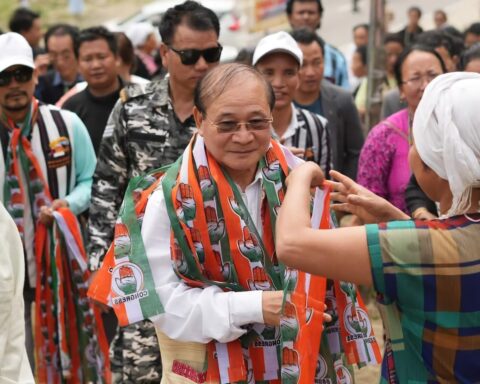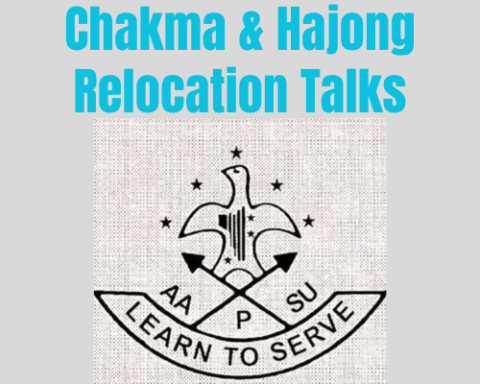Itanagar: Traversing through tough and steep terrains of the Himalayan mountains, navigating dense jungles to crossing traditional hanging bridges, and setting up camps in tents, the Siang district’s election machinery has had to literally move mountains to conduct polls at the remotest and inaccessible places of the district.
All the effort, to ensure that the Election Commission of India’s (ECI) commitment of “No Voter is Left Behind” is met.
Gate and Gasseng villages falling under Payum circle of 32-Rumgong (ST) Assembly Constituency are two of the twenty-five polling stations of the Siang district categorized as ‘Shadow Zones’, i.e., areas that have no mobile or internet or other public connectivity.
The district has 17 such polling stations under 32-Rumgong (ST) Assembly Constituency and 8 (eight) such polling stations under 35-Pangin (ST) Assembly Constituency.
To overcome the predicament and establish direct communication with the district headquarters on poll day where bi-hourly voting data is to be relayed, the election machinery has taken up the initiative of establishing Very High Frequency/High Frequency (VHF/HF) stations, thereby ensuring communication coverage through wireless walkie-talkies.
As a testament to human fortitude, two signal-testing teams led by Siang Police accompanied by recruit constables (RCs) and porters trekked for three days straight to Gasseng and Gate villages.
Situated 147 km and 153 km away from the district headquarters respectively, the last vehicle point is at Molo village. From thereon, Gasseng and Gate are a treacherous foot trek of 45 and 50 kms respectively. This is the same foot trek that shall be undertaken by the polling teams as well.
Led by Arunachal Police head constables Daniel Darang and Geny Bam, the teams started on foot from Molo village on April 14 and after twelve hours reached Gaseng. The team then marched on ahead to Gate on April 15 and the journey culminated back in Molo on April 16.
The signal trial of the HF sets established at 8-Gasseng, and 9-Gate polling stations has been successfully conducted. This now enables direct communication between the polling stations and the district control room at Boleng, the headquarters of Siang district.
“Scaling high peaks and narrow footpaths for 3 days straight, the extremely difficult and dangerous route truly tested our physical and mental tenacity. However, I am glad that our endeavour will yield positive results for these two villages and for the electoral process,” stated Darang.
Commending the spirit of the team, Siang deputy superintendent of police, Sange Tenzin, district stated that the electoral process has become increasingly technology driven.
“The absence of mobile and internet connectivity renders communication nearly impossible. This is an initiative to bridge the communication gap,” Tenzin said.
The teams consisted of RCs Kamnyai Suyang, Wakap Ketok, Gekto Tangu, Mathey Lipo, Kaling Taten, Kaling Taten and Jhon Palon, WCs Pulay Hakhun and Yowa Begi and they were accompanied by porters Tayi Tayor and Tamanag Yaying.
Established in 1963, Payum is one of the oldest circles of the state but is yet to be connected by a motorable road.
Efforts are being made through the Central Road and Infrastructure Fund (CRIF) for constructing road from Pagak village (in Kaying circle) to Bogu (in Payum circle) to link Bille, Payum, Mega, Gaming, Bogu, Gaseng and Gate villages and the proposed 72-km Bille-Migging road would also connect Payum circle with Migging circle of Upper Siang district.
Meanwhile, the polling teams of Gasseng and Gate stations have been dispatched with polling materials including Electronic Voting Machines (EVMs) and Voter Verifiable Paper Audit Trails (VVPATs).
Out of the total 2,226 polling stations in Arunachal Pradesh, 228 can only be accessed via foot march. To reach 61 of these polling stations, a two-day foot march is required, while in seven other booths, polling officials must march for three days to reach their designated locations.
Also read: AAPSU confirms discussions on Chakma & Hajong relocation to Assam





